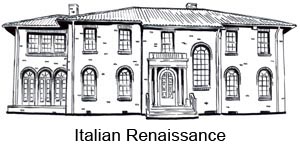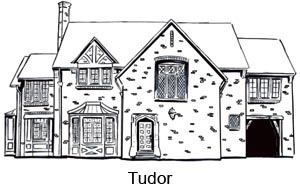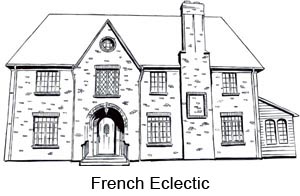



Boulevard Oaks
Architectural Styles
Most of the buildings in Boulevard Oaks are two or two-and-a-half story houses built in the Revival styles that were popular during the 1920s and 1930s. About one-third of the houses in the neighborhood are Tudor Revival. The next most common style is Colonial Revival. Other styles found in the neighborhood include Italian Renaissance, Spanish Eclectic, French Eclectic, and Neoclassical.
The style known as Tudor Revival includes details from several different types of English architecture. Some typical features —prominent front gables, steeply pitched roofs, and massive chimneys — are medieval. The decorative details often found on Tudor houses are based on more recent buildings from the Renaissance period. These include decorative brickwork, stone accents, and half-timbering. Half-timbering is a type of wall surface that looks like massive beams, with brick or stucco in between the wood.
The Colonial Revival style became popular in the early 1900s. Around that time, historical accuracy was fashionable in architecture. Several books and magazines were published with drawings and photographs of early Colonial buildings. As a result, the Colonial Revival buildings constructed during those years tended to be faithful reproductions of colonial architecture. The Colonial Revival houses are rectangular in shape, with symmetrical facades. The front doors are emphasized with small porches or scrolled pediments.
Boulevard Oaks includes several Spanish Eclectic houses. Stuccoed walls, balconies, and arched entryways are common features. This style of house typically has very shallow eaves, which differentiates it from the similar Italian Renaissance style.
Italian Renaissance houses have low-pitched roofs made of clay tile. The eaves are wide and often decorated with brackets or braces. Walls may be covered with stucco. Arched windows and doorways are common. The front door of these houses is often in a central wing that either projects forward, or is set back from, the rest of the house.
A small number of houses on the boulevards show a French Eclectic influence. They are usually made of brick, with massive chimneys. In that way, these French houses are similar to the Tudor Revival style. However, unlike Tudor houses, French Eclectic houses do not have prominent front gables that showcase the front door. Instead, the doors are set into modest openings in the front façade.
A few homes in Boulevard Oaks were built in the Neoclassical style. Full-height front porches, supported by classical columns, make these houses easy to identify.